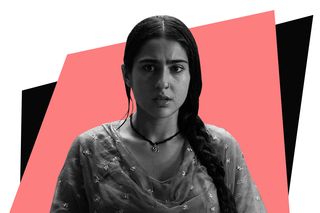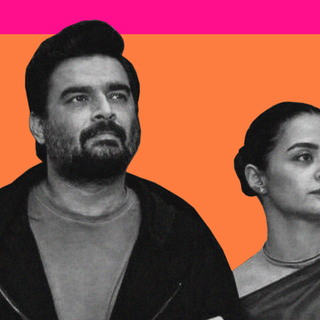
‘Atrangi Re’ Attempts to Simplify Mental Health, but Ends Up Romanticizing It
The movie’s undoing lies in denying mental health subjects the sensitivity they deserve.

The one thing Atrangi Re deserves credit for is ensuring the audience is never bored throughout its two-and-a-half-hour runtime. But unfortunately, its twists and turns — no matter how engaging — come at the cost of romanticizing mental illnesses for sheer dramatic effect.
“Drama,” interestingly, is the theme of Atrangi Re. It stars Sara Ali Khan and Dhanush as “Rinku” and “Vishu” — one, a manic-pixie-dream-girl-ish character; the other, a doctor who will ultimately “set her free” her from her inner demons. Everything — the elaborate sets, depictions of the female protagonist’s vivid hallucinations, the portrayal of her childhood trauma, Akshay Kumar’s costumes, the way the characters go about their lives — is overwrought with drama.
While this dramatization nails the formula of Hindi cinema, it frames trauma and mental health as means to an end. The end being “dramatic love,” of course. At its core though, the movie serves as a cautionary tale against the increasingly intolerant religious sentiments brewing in India against inter-faith marriages. It has been released at a time when Islamophobia is on the rise in India, even as its population continues to emerge from “mass trauma” the pandemic inflicted upon us. So, yes, the subjects chosen by the filmmakers are relevant. But Atrangi Re‘s undoing lies in denying them the sensitivity they deserve by treating them simply as plot devices for dramatic effect.
If I had any clue the movie was about childhood trauma-induced psychosis, I would have found the movie’s title positively revolting. In the words of its director, Aanand L. Rai, “atrangi” translates to “funnily weird.” Obviously, there’s nothing funny about living with a mental illness — it is literally considered a mental disability. And “weird” is among the most common words used to stigmatize people living with mental health disorders, according to a 2007 study.
Unfortunately, Rai’s words would only foreshadow his treatment of mental health in the movie. Calling Rinku’s psychosis “paagalpan” or “madness,” the film uses the condition for comic effect. “Rinku deserves our sympathy. As details bleed out, however inconsistently, they paint a picture of a pitiable character at the receiving end of an unloving family… [Yet] for easy laughs, nothing seems off-limits — not emotional wounds, or mental illness,” Stutee Ghosh wrote in The Quint. The marriage between drama and mental health is uncomfortable and insidious.
Related on The Swaddle:
‘Decoupled’ Tried to Satirize ‘Toxic’ Societal Norms, Ended Up Normalizing Them
From time to time, relying on Rinku’s hallucinations as a plot device to drive the overarching narrative of “dramatic love,” the movie does little to destigmatize what its own protagonist is going through. In fact, making her psychosis the biggest reveal of Atrangi Re, too, feels discomfiting — almost as if it was being objectified, especially since “mental health” has become somewhat of a trending topic lately.
This is precisely why I’m wary of movies about mental health. From Fatal Attraction to Silver Linings Playbook — they win the most prestigious of awards and make the audience feel like they should appreciate what little is being done towards having conversations on mental health. But, at the end of the day, it makes me wonder if problematic representation should qualify as representation — given that narratives like the one Atrangi Re has chosen to depict, might serve to further the existing stigma against mental illnesses.
What further added to my uneasiness as an audience living with multiple mental health issues myself was how Ashish Verma’s character — Dr. Madhusudan, a psychiatrist — talks about Rinku. He says she should be “kept in a museum,” and it’s unfortunate that she’s instead “freely roaming” in the streets of Delhi. To make matters worse, he congratulates his friend Dhanush for dodging a bullet by not ending up with her. Perhaps, it was too naive of me to expect a mental health professional to be more — or, at all — compassionate to Rinku, especially in a world where people are already biased against dating people living with mental illnesses. His lack of sympathy for someone, who experienced childhood trauma so intense that they lost touch with reality to be able to cope, is alarming.
Moreover, the narrative falls prey to yet another trope: “love cures all.” Rinku’s childhood trauma led her to believe in the existence of a character, who didn’t exist; Vishu’s love brings her back in touch with reality. Well, in real life, things aren’t nearly as simple. But by suggesting it is, Atrangi Re almost criminally oversimplifies the complex experience of navigating the neurotypical world while living with psychosis; it passes on the message that all one needs to do to be “cured” of mental illnesses is to find love. In a culture where “settling down and having babies” is seen as the ultimate solution to most of life’s problems, this import seems highly irresponsible.
Moreover, the movie simultaneously puts forth toxic ideals of love. When Vishu explains how he met his fiancé in college and they simply fell in love, Rinku mocks his story, saying she doesn’t consider it “love” unless it’s tumultuous, mutinous, and results in a handful of people being beheaded. Unfortunately, that sets the tone for the love that eventually blossoms between the pair — furthering, yet again, a toxic notion of love and making trauma seem aspirational.
Related on The Swaddle:
Many Indians Are Experimenting With Psychedelics, Other Drugs to Deal With Mental Health Issues
However, to give credit where it’s due: despite its nauseatingly caricaturish depiction of what living with psychosis looks like, the filmmakers did do a not-too-terrible job at explaining what psychosis is, and what caused Rinku’s character to experience it. By using humane, everyday metaphors and accessible, non-jargony language, Dr. Madhusudan explained to Vishu and an audience that would otherwise have been largely unaware of the condition, how and why psychosis manifests.
Further, Dr. Madhusudan’s insistence on psychiatric medication as a necessary part of her treatment could serve to normalize medication for mental health. In a country where its consumption is considered a sign of weakness, or a “quick fix” to avoid “manning up” and dealing with one’s problems, this medication discourse could be a silver lining to the otherwise loathsome take on mental health.
However, the bit about the psychiatric medication did make me uncomfortable — yet again — to come to terms with medicating someone without either their own consent or that of a family member appointed by them to make decisions on their behalf.What is even more distressing is that brings to mind instances of people, and especially women, living with mental health conditions not being considered “capable” of making decisions for themselves, which often leads to society — and even legal systems — denying them agency over their own lives. Britney Spears’ recently-concluded conservatorship certainly comes to mind here.
“Informed consent is a distant dream, people are just grabbed and brought,” Dr. Bhargavi Davar, director of Pune-based Bapu Trust, had told The News Minute in 2017. Rather than normalizing the practice, I was left wishing the movie made its audiences question the sexism, able-ism, and stigma against mental health that drives the phenomenon. But, perhaps, that was too far-fetched of an expectation from a movie that couldn’t even spare sensitivity to its protagonist’s ongoing experience of psychosis.
Overall, one might be tempted to say this is a glass-half-full situation. Mental health and psychosis rarely make it to the big screen — especially with mainstream actors essaying these characters, and Karan Johar promoting it. But the fact remains that mental health is still heavily misunderstood in India. As such, dramatizing and romanticizing it to a point where it, too, loses touch with reality, seems almost worse than not engaging in the discourse at all.
Devrupa Rakshit is an Associate Editor at The Swaddle. She is a lawyer by education, a poet by accident, a painter by shaukh, and autistic by birth. You can find her on Instagram @devruparakshit.
Related


Why Some People Feel More Lonely Than Others
